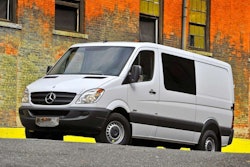The Polk County Sheriff’s Office says will add 10 propane autogas patrol vehicles to its fleet, including seven Ford Crown Victorias, two Chevy Tahoes and one Ford F-350 pickup.
The move is expected to save the department more than $20,000 annually in fuel costs.
The law enforcement fleet began switching to autogas in March through Blue Star Gas, which provides the Alliance AutoGas program for West Coast fleets. Auto Additions of Salem, Ore. performed the bi-fuel vehicle conversions while Blue Star Gas installed an on-site fuel station and delivers year-round fuel supply.
“The sheriff’s office was looking for a way to save money on the fuel costs, as patrol cars travel an average of almost 25,000 miles each year and fuel bills are very noticeable each month,” says Sergeant Mark Garton of the Polk County Sheriff’s Office. “Not only is there a 50-cent-per-gallon federal tax credit for operating on alternative fuels like propane autogas, filling up with autogas also costs substantially less than gasoline. We expect to save thousands annually on fuel costs alone by operating autogas vehicles.”
Garton says the new clean vehicles could operate up to 10,000 miles between regular services since autogas is a cleaner burning, higher octane fuel than gasoline. Deputies say they haven’t detected any loss in vehicle performance since switching to propane-powered cruisers.
The fleet’s bi-fuel Prins Vapor Sequential Injection (VSI) system can revert to gasoline automatically if the autogas tank happens to run low, and can also be moved from retiring vehicles to newer ones with very little vehicle downtime.
“The ability to switch back to gasoline is a tremendous option for our fleet because in an emergency situation, we not only have a full tank of propane but also a backup full tank of gasoline,” says Sergeant Garton.
Propane autogas is the most widely used alternative fuel in the world, with a total of 18 million autogas vehicles globally. U.S. autogas fleets currently save upwards of $2 per gallon on fuel costs versus gasoline, and they also save money on maintenance since autogas is so much cleaner than gasoline. Autogas is also a domestically produced fuel, with 98 percent of the U.S. autogas supply made in America.









